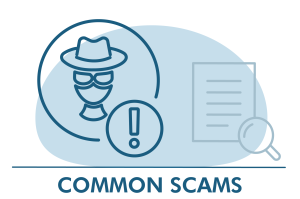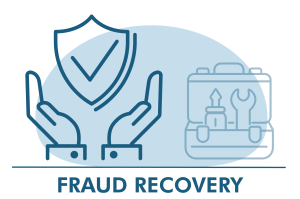Financial Fraud: Stay Informed & Take Control
Scam Spotlight:
Holiday Shopping Scams
The holidays are a peak time for scammers to catch consumers unaware. Whether through social media ads leading to fake shopping websites, fake shipping and delivery notifications or even fake charities looking to take advantage of the increased spirit of giving, there are a number of ways a scammer can steal your information. Stay vigilant during the holiday shopping season, and be mindful of where you choose to enter your personal information.
Ways to protect yourself:
- Avoid interacting with unfamiliar retailers and charitable organizations, especially over the holidays.
- When shopping online, even with a popular retailer, scan the website for common red flags: unsecure or misspelled URLs, incomplete or missing About, Privacy and Shipping & Returns pages, low quality images or unconventional payment options.
- Don’t click on any suspicious links sent via email or text. Even if a notification is expected, always contact the shipping company or retailer through a phone number or website you know is real.
- If an offer is too good to be true, it probably is. Be cautious of emails and texts offering cheap holiday travel packages, airline tickets or hard-to-find gift items.

Common Scams:
- Bitcoin ATM Scams
A new fraud trend has emerged, where the victims are urged by fraudsters to withdraw cash from their accounts and deposit it to a Bitcoin ATM. The scenarios can vary, but include overpayments on refunds, fraudulent transactions on accounts and keeping the funds safe by converting them to Bitcoin.
TruWest will never ask you to deposit money into a Bitcoin ATM. Once money is deposited into a Bitcoin ATM, it is unlikely to be retrieved.
Ways to protect yourself:
- If in doubt or if you receive any suspicious or unexpected communication, please call TruWest directly at 1 (855) 878-9378.
- If you receive an email or text message that you do not expect, please do not reply or click any links. To verify the validity of a transaction, call TruWest at 1 (855) 878-9378.
- Scammers Posing as TruWest
Credit union members have reported phone calls that appear to be from the credit union, but are in fact fraudsters spoofing the credit union’s phone number. These callers will ask for personal information in order to gain access to your online banking account. Once the fraudster has access to the account, fraudulent transactions can be made.
Ways to protect yourself:
- A legitimate call from our Fraud Department WILL NOT ask for your online banking login credentials, personal account information or Visa® card numbers, expiration dates or 3-digit security codes. If you’re unsure if a call is legitimate, end the call and dial 1 (855) 878-9378.
- If you receive a text that your card has been locked, do not give out any personal information. Instead, call the credit union at 1 (855) 878-9378 to confirm activity on your account. You can also use our Card Manager1 app to turn your cards on and off if you have any safety concerns.
- Imposter Scams
Ever get an unsolicited call from tech support at Microsoft, or an “urgent” email from PayPal asking for your login info to resolve an issue with your account? Imposter scams can take the form of calls, texts, emails or other correspondence from businesses and organizations you know or trust. Their purpose is to steal your login credentials, payment information or other personal details in order to defraud you, and they are the most common type of scam out there.
Ways to protect yourself:
- Pay attention to red flags such as urgent or threatening language, links with unrecognizable URLs, low-res imagery, grammatical errors and strange sender email addresses.
- Do not give out your login credentials. If you’re unsure if an email is legitimate, go to the business’s official website to log in, instead of clicking on any email or text links. If you’re unsure if a call is legitimate, hang up and call the business back using a known good phone number for the business.
- Fake Shopping Sites
Online shopping scams can take the form of fake retailers or even spoofed sites (fraudulent copies of real, legitimate sites) used to capture and steal your information. When clicking on ads or shopping online, it’s important to know the key differences between a legitimate and a spoofed website.
Ways to protect yourself:
- Check if the website is secure. Most reputable online businesses use secured sites, which are designated with a padlock symbol next to the URL. But be warned, even scammers can use secured sites.
- Pay attention to quality. Though AI technology has made it easier for scammers to appear legitimate, fake websites may still be riddled with grammatical errors or low-res imagery. Misspellings can also appear in the site URL, which might otherwise mimic a legitimate website domain.
- Check out the About pages. While a fake website might look and feel legitimate, scammers will often neglect the About section, Privacy Policy and Shipping and Returns info.
- Fake Check Scams
Reports of fake check scams are on the rise. Whether you’ve been “hired” as a mystery shopper, received the check as prize money for a sweepstakes or lottery or received overpayment for something you sold online, the goal is always the same—to get you to deposit a fake check and send money back.
Ways to protect yourself:
- If you’ve received an unexpected check or a check for more than you expected and have been asked to send money back once it’s deposited, DO NOT deposit the check. It can take weeks for a financial institution to confirm a bad check once it’s deposited, and you may be out the amount of the check and any money sent to the scammer.
- If you are unsure, you can contact TruWest at 1 (855) 878-9378 or at one of our Financial Service Centers to verify if a check is valid or not.
- ATM Scams
Some scammers have gone as far as to target credit union members in person, asking—even offering to pay—them to deposit a check and withdraw cash for them. The deposited checks are ultimately found to be fake, stolen or lacking sufficient funds. In such cases, the member is then held responsible for an overdrawn account.
Ways to protect yourself:
- It should go without saying, but never deposit a check for someone you don’t know.
- Ask a TruWest Financial Service Representative for assistance if someone approaches you and asks you to make a deposit.
- “Cat-phishing” Scams
The term “catfishing” refers to tricking a person into thinking you are someone you’re not. Often, this occurs on dating sites and social media for various reasons, but cybercriminals will also use this tactic in order to commit phishing scams. By posing as a romantic interest, a scammer might build a rapport with the target, even using voice-changing software to send audio messages and disguise their true identity.
If the target falls for the fake audio messages, they then receive a video file of their newfound love interest. Except, the file is actually a dangerous piece of malware designed to grant the cybercriminal access to the victim’s entire system.
Ways to protect yourself:
- Keep your social media accounts private, and only accept friend requests from people that you know and trust.
- If you meet someone online, be sure to verify their identity. You could use a search engine to find their other social media profiles or simply ask to have a video call to make a face-to-face connection.
- Remember that cybercriminals can use more than just links within emails to phish for your information. Always think before you click!
- VIN Cloning
In recent years, it has become common for criminals to gather legitimate VIN information from dealerships, parking lots and off the street, then use that information to sell stolen vehicles. The stolen vehicles are often the same year, make and model as the legitimate vehicles. Once the stolen vehicles are located, the authorities will seize them and return them to their rightful owner. This leaves innocent car-buyers with no vehicle and an unsecured loan.
Ways to protect yourself:
- Check the VIN on the National Insurance Crime Bureau’s website.
- Utilize Carfax or AutoCheck.
- Review that the vehicle VIN matches the loan documents prior to signing.
- Text Scams & Shortened URLs
Smishing (text message phishing) continues to grow in popularity. Smishing attacks can be difficult to catch, especially because both legitimate and phishy text messages tend to use shortened URLs. But cybercriminals often use this technique to redirect you to a malicious website or to a download page for malware. Don’t be fooled!
Ways to protect yourself:
- Think before you click. Were you expecting this message? When did you give this company your phone number? Did you sign up for text notifications?
- Be cautious of a sense of urgency. The bad guys often use words like “urgent” or “ATTENTION” to try and trick you into impulsively clicking a malicious link.
- If you think the text message could be legitimate, try typing the shortened URL into a URL expander tool, such as GetLinkInfo or ExpandURL. These tools will reveal where the shortened URL will direct you, without taking you to the redirected site.
Financial Fraud Resources
Have you been a victim of fraud or identity theft, or do you simply want to stay informed? The links below have additional information and resources that will help you work through your specific situation.
Contact Credit Bureaus
If you feel your personal information has been compromised or you have been a victim of a scam, your first step will be to contact the three credit bureaus:
Equifax
(800) 525-6285
Equifax.com
Experian
(888) 397-3742
Experian.com
TransUnion
(800) 680-7289
TransUnion.com
![]()
- Add a Consumer Statement (including your phone number) to each credit bureau.
- Review your credit reports on each credit bureau for activity that you don’t recognize.
- If necessary place a freeze on your credit report.
You may review your report on each bureau annually for free here or by calling (877) 322-8228. Please note: this free review will only include the report information, not your score.
Report Fraud
If you’ve received a suspicious communication via phone call, email or text, or believe you have been the victim of a scam, you can report the incident with the Federal Trade Commission (FTC) below:
Report Identity Theft
If you are worried your identity has been stolen or your personal information has been breached or compromised, file a report below:
Better Business Bureau
You can also report scams and identity theft to the Better Business Bureau (BBB), in addition to the FTC, for additional assistance and greater visibility to other consumers.
Other Fraud Resources
GET A PERSONALIZED RECOVERY PLAN
IdentityTheft.Gov
Identity Theft Resource Center
BBB Scam Survival Toolkit
STAY INFORMED
The material and information presented here is for informational purposes only and is not intended to be used as financial, investment, legal or other advice. Please consult with a professional concerning your specific circumstances.
1This feature is available on the TruWest Card Manager app for iPhone and Android devices. Data connection required. Message and data rates and wireless carrier fees may apply. Must be a TruWest member with a minimum $5 opening deposit and continuing balance. Terms, conditions and restrictions apply. When you place a lock on your debit or ATM card via the TruWest Card Manager app, it will prevent most types of card transactions from being processed until you take action to unlock your card. Any virtual cards linked to the locked card will also be locked. However, the lock will not stop card transactions presented as a new recurring or a previously scheduled recurring transaction by the merchant, transactions using other cards linked to your deposit account, or the posting of refunds or credit adjustments to your account. Additionally, transactions that occurred prior to locking the card will not be affected. Locking your card is not a replacement for reporting your card lost or stolen.


